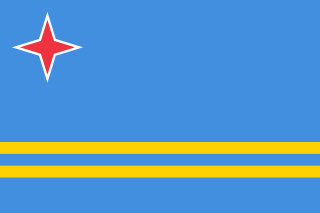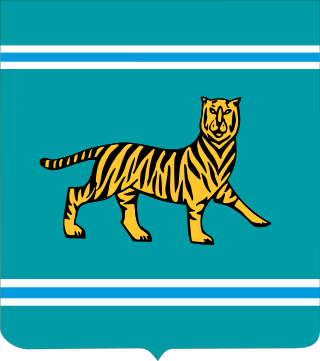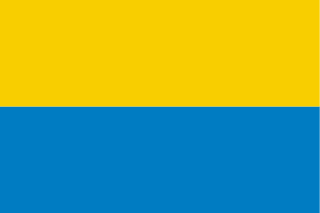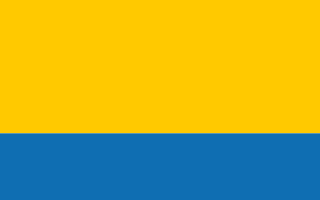
The national flag of Aruba was adopted on 18 March 1976, along with the official anthem "Aruba Dushi Tera". The flag was partially designed by vexillologist Whitney Smith. On 18 March Aruba celebrates National Anthem and Flag Day, marked by local events across the island. It is also a significant day as it represents the Kingdom of the Netherlands giving Aruba an autonomous status.

The national flag of Cape Verde was adopted on 22 September 1992, replacing the flag adopted during independence.

The flag of Crimea is the flag of the Autonomous Republic of Crimea in Ukraine and the Republic of Crimea controlled by Russia. The flag was officially adopted on 24 September 1992 as the flag of the Republic of Crimea, readopted on 21 April 1999, then readopted on 4 June 2014 as the flag of the Republic of Crimea, annexed by the Russian Federation.

The Jewish Autonomous Oblast is the only Autonomous Oblast in Russia. It is situated in the Far Eastern Federal District of Russia.

The coat of arms of the Jewish Autonomous Oblast is the official coat of arms of the Jewish Autonomous Oblast in Russia. It consists of a Siberian tiger standing on four legs with the tail and the head turned upwards, of which the latter is facing the observer. This specific position and occurrence of the tiger symbolizes the history and development of the Oblast. The emblem is a heraldic French shield and the background represents the color of the geographical characteristics of the Russian Far East, which includes taigas, hills, and meadows.

The civil flag that serves as the symbol of the state of Mecklenburg-Vorpommern, Germany, consists of five horizontal stripes, that are from the top to bottom: blue (ultramarine), white, yellow, white, and red (vermilion). It was designed by Norbert Buske and adopted on 29 January 1991. It is a combination of the historical flags of the Mecklenburg and Western Pomerania.

The flag of the Ivano-Frankivsk Oblast is the official flag of Ivano-Frankivsk Oblast, an oblast in Ukraine. It is a symbol of the Ivano-Frankivsk Oblast that inherits a historical tradition of using regional symbols and is an attribute of the local government and executive powers.

The Flag of Novosibirsk Oblast is the official symbol of Novosibirsk Oblast, Russia.

The flag of the Chernihiv Oblast is the official flag of Chernihiv Oblast, an oblast in Ukraine. It was designed by I. Sytyi, A. Hrechylo and I. Pavlenko, and officially adopted by the resolution of a regional council on July 11, 2000.

The flag of Chelyabinsk Oblast was adopted on 27 December 2001.

The flag of Upper Silesia serves as the symbol of the historical and geographical region of the Upper Silesia in Poland, and as one of the symbols of the Silesian people; it is divided horizontally into two stripes: yellow on the top and blue on the bottom. It originated as the flag of the Prussian Province of Upper Silesia adopted in 1920, with its colours based on the coat of arms of Upper Silesia. The flag is also popular symbol used by the Silesian Autonomy Movement and the Silesian Separatist Movement

The civil flag of the Silesian Voivodeship, Poland is triband rectangle, divided into three horizontal stripes, that are from top to bottom: blue, yellow, and blue. The blue stripes are twice the size of the yellow middle stripe. The state flag is a blue rectangle with yellow eagle placed in its centre. It was designed by Barbara Widłak, and adopted on 11 June 2001.

The flag of the West Pomeranian Voivodeship in Poland is a triband rectangle, divided vertically in 3 stripes of white, red, and white colour, and with the coat of arms of the voivodeship in the middle. It was adopted in 2000.

The civil flag of the Opole Voivodeship, Poland is a rectangle divided into two horizontal stripes, with yellow on the top, and blue at the bottom. The top stripe is twice the size of the bottom one.

The flag of the Świętokrzyskie Voivodeship, Poland is a rectangle divided into four parts. Its left part features a yellow vertical stripe, which wight equals to 1:4 of the wight of the flag. Its right part is divided into three horizontal stripes, that are, from top to bottom: blue, white, and red. In the middle of the white stripe is placed the coat of arms of the voivodeship. The first version of the flag had been adopted in 2001, and current version is used since 2013.

The flag that serves as the symbol of the historical and geographical region of the Western Pomerania is divided horizontally into two stripes: light blue on the top and white on the bottom. It originated as the flag of the Province of Pomerania, Prussia, used from 1882 to 1935. Since 1996, it is officially recognized as the symbol of the historical region of Western Pomerania within Mecklenburg–Western Pomerania, Germany.
The flag of Earth is a concept of a possible flag design meant to symbolize the planet Earth, humankind, or a possible world government.

The flag, that serves as the symbol of the city of Zielona Góra, Lubusz Voivodeship, in western Poland, is divided into three fields, including the vertical yellow stripe on the left, and two equally-sized horizontal stripes, white on the top, and green on the bottom, on the right. It was established in 1965.

The flag that serves as the symbol of the historical and geographical region of the Mecklenburg is divided horizontally into two stripes: light blue on the top and white on the bottom. It originated as the flag of the Grand Duchy of Mecklenburg-Schwerin, adopted in 1813. Since 1996, it is officially recognized as the symbol of the historical region of Mecklenburg within Mecklenburg-Vorpommern, Germany.


















